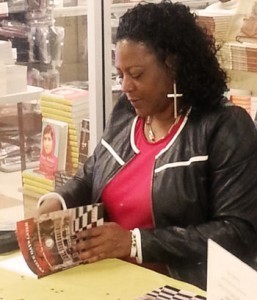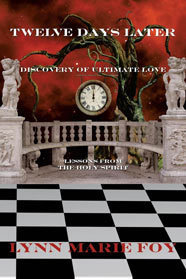Peter Lopez Jr.'s Blog: Xulon Press Blog , page 44
November 26, 2014
Xulon’s Book Search Optimization / Metadata Service: Explained
 Out of all the services that Xulon Press’s editorial department offers, there is no guessing which one is the most complicated to our authors. In fact, the average person probably doesn’t know what “metadata” or “search optimization” means. It probably sounds like a few technical terms that only a Google engineer could possibly understand, right? Wrong. It’s actually a pretty simple concept, if explained in layman’s terms and not technical terms.
Out of all the services that Xulon Press’s editorial department offers, there is no guessing which one is the most complicated to our authors. In fact, the average person probably doesn’t know what “metadata” or “search optimization” means. It probably sounds like a few technical terms that only a Google engineer could possibly understand, right? Wrong. It’s actually a pretty simple concept, if explained in layman’s terms and not technical terms.
Xulon Press offers, for an additional fee, a “Book Search Optimization” service or what is sometimes referred to as a “metadata” service. Most people these days get a lot of what they’re looking for by searching for it on the internet. Where do they search for it? In a search engine. Usually Google. So, in order for your book to show up in search results for certain topics (to which your book pertains), it needs to contain keywords that people are searching for regarding this topic. This is where the metadata comes in: it is essentially a block of words or phrases that are likely words that people will be typing into Google.
Now, what is important for authors to understand is the metadata is not meant for a human to read it. What the metadata looks like to you, as a human reader or author, might as well be in another language fit for a search engine to read. (This language is pretty basic and omits unnecessary words.) This is not something that people will use to be informed about your book like the back cover copy will, for instance (another one of Xulon Press’s editorial services). This is meant for a search engine to read and thus place your book’s listing (on Amazon or iBooks or Barnes & Noble) as close to the top of those Google search results as possible.
The more keywords the metadata contains that is actually relevant to the search, the higher the ranking on the list of results. (Though there is some additional back-end, Google-engineer type of magic happening that further determines a result’s ranking, but for the sake of this blog post, we’re sticking to the metadata.) So, let’s demonstrate what you as an author can expect to see in a metadata block for a book. A popular and well-known book that we can use as an example is The Five Love Languages by Gary Chapman. If this book were to be assigned to me to write the metadata, this is an example of what the metadata would look like:
Love languages. Five love languages. Five love languages book. Five love languages Gary Chapman. Gary Chapman. Gary Chapman love languages. Gary Chapman author. What are the five love languages? What is my love languages? Love language book. Discovering your love language. Communicating your love language. What are love languages?
Get the gist? These are all keywords or phrases that someone could potentially be typing into Google. Therefore, when they are present on the back end within the metadata, Google reads them and then, your book pops up on the search results list in a matter of nanoseconds.
Notice, too, that these are keywords and phrases that are written in that “special language” that omits unnecessary words and phrases. Words such as “she”, “he”, and most adjectives are not vital to have in the metadata because those are probably not words that people are typing into search engines.
Questions? I’d be happy to answer them in the comments below.
The post Xulon’s Book Search Optimization / Metadata Service: Explained appeared first on Xulon Press, Christian Self Publishing.
November 21, 2014
How authors can overcome their doubt
 Recently, I’ve been blessed to work with a number of authors in one-on-one coaching sessions. In helping them begin their publishing journeys, I’ve needed to help them overcome the obstacles of doubt and lack of confidence. Despite having excellent ideas for their writing, many struggled in thinking their book would ever matter.
Recently, I’ve been blessed to work with a number of authors in one-on-one coaching sessions. In helping them begin their publishing journeys, I’ve needed to help them overcome the obstacles of doubt and lack of confidence. Despite having excellent ideas for their writing, many struggled in thinking their book would ever matter.
I noticed four areas where lack of confidence was most evident:
Doubt in their writing abilities.
Doubt in their message or story.
Doubt their book would ever sell.
Doubt their book would have an impact on the lives of others.
Do you sometimes feel these too?
One aspect we enjoy the most here at Xulon is taking the time to listen and help authors see there’s no reason to lack confidence in anything the Lord has asked them to do. I believe greatly that people need coaches and cheerleaders to inspire them and build them up. We are confident in you and your writing. Stay strong in that faith and allow us to help you slay each doubt.
I encourage you to call one of our Publishing Consultants today at 1-866-381-2665 and let them put together a plan to help you get on the road to becoming a published author this year.
Blessings,
Don Newman
Director of Acquisitions
The post How authors can overcome their doubt appeared first on Xulon Press, Christian Self Publishing.
November 13, 2014
Successful Author Spotlight: Lynn Marie Foy
 When you are dealing with the passing of a loved one, the last thing you want to do is write a book about your testimonial highlighting
When you are dealing with the passing of a loved one, the last thing you want to do is write a book about your testimonial highlighting
your loss.
It was the farthest from Lynn Foy’s mind when she suffered back-to-back losses, with the death of her mother Verla to congestive heart failure and then, a short time later, losing her fiancée Terence to murder.
God, however, had a purpose for her grief and guided Lynn to write her pain and healing journey for her first published book, Twelve Days Later.
“This book was all God using me as a vessel,” she states. “When I look back on my writing, I wondered how I found the words and scriptures for the book, so it had to be God wanting people to know how to get through the grieving process. It’s okay to cry and be sad, but also to know that God can bring us through anything.”
Grief Put in Words
When Lynn looks back over all the recent events that have unfolded in her life, she believes that, in some way, God was preparing her for this emotional passage she would take.
“Years before my loved ones passed, I had become more involved in Bible studies because I wanted to know more about God. So once [their deaths] happened, it kind of helped to know that I could turn to God during situations like these. It became more about me building a relationship with God.”
A minister from Lynn’s church came to speak with Lynn’s mother Verla during the end of her battle with congestive heart failure and was later called again to assist Lynn in making sense of Terence’s sudden death. The minister had also been a psychologist for the United States Army.
“She told me to keep a journal of what I was going through at the time,” Lynn recalls.
“[Through those journal entries] God spoke to my heart at that time and said He wanted me to write. I had always talked about writing a book, but I didn’t know what I should write about.”
The idea soon formed to write a book detailing her handling of Verla and Terence’s deaths, written to help others in similar grief situations find hope for future healing.
“Reliving her [Verla’s] sickness and passing away was a trial, but it was kind of therapeutic in a way. I definitely cried, as I explained in the book, about when Terence died. Once I started writing, it started to come together as God helped me with it. That’s how I know that it was nobody but God that made this book happen,” she claims.
Publishing the Hope
God continued to lead Lynn in the publishing of her book when she encountered Xulon Press authors and books three separate times.
She soon contacted Xulon Press and spoke with Acquisitions Representative Eric Sullivan, who discussed with her at length about the publishing process and the goal to have their authors influence others through their books.
“Eric talked to me for two hours and answered all my questions. He didn’t make me feel rushed and to sit two hours on the phone without being agitated, that meant a lot to me,” Lynn fondly mentions.
“The time spent with Xulon Press was good, as everything with publishing was new to me. I appreciate Xulon Press, and I admire them for helping authors publish their books.”
Seeing “published author” attached to her name is still surreal to Lynn, who considers herself a shy person, but she believes what she has experienced was intended by God to give reassurance to others.
“You have to know that God is God, and He is the one to tell you to write the book. It will come to you, because if it is something God wants you to do, He will make sure it happens. I’m just going to trust God with this and the same for those writing a book,” Lynn states.
She looks to 1 Corinthians 1:26-31, which spoke to her heart during her book’s writing process, to empower her again with her next book. The verses from God’s word speak about how God uses ordinary people to bring glory to His kingdom, which Lynn says accurately describes how He transformed her pain into purpose.
“When you rely on God, He can get you through anything that you are facing.”
Get Lynn Marie Foy’s book “Twelve Days Later – Discovery of Ultimate Love” on the Xulon Press Bookstore.
The post Successful Author Spotlight: Lynn Marie Foy appeared first on Xulon Press, Christian Self Publishing.
November 4, 2014
Xulon Press Launches the 2014 Fall Christian Author Awards

Sponsored by Xulon Press, the Christian Author Awards recognizes preeminent new Christian authors who are independently published.
Sponsored by Xulon Press, the Christian Author Awards recognizes preeminent new Christian authors who are independently published. Host of the first ever Christian Author Awards, Xulon Press is excited to once again extend the opportunity to Christian authors to have their work recognized and given due credit. The Christian Author Awards exists to honor exceptional books written by Christian authors that are published independently by non-traditional publishers.
Entries must be received by midnight EST on Sunday, December 14th, 2014. The winners will be announced on December 31st, 2014. All category and grand prize Winners will posted to the contest website with a link to each book’s purchasing page.
The first place grand prize winner will receive a full page ad in the 2015 BEA and ICRS editions of the Christian Book Browser Catalog ($3,198 value), book placement at both the BEA and ICRS trade shows ($1,198 value), and $500 in cash. Second place will receive a half page ad in the 2015 BEA and ICRS editions of the Christian Book Browser Catalog ($1,798 Value), and $200 in cash. Third place will receive a quarter page ad in the 2015 BEA and ICRS editions of the Christian Book Browser Catalog ($998 value), and $100 in cash. Additionally, the first, second, and third place winners in each category will receive: a highlight ad in the 2015 BEA and ICRS editions of the Christian Book Browser Catalog, and a certificate of achievement.
Xulon Press, a part of Salem Communications Corporation, is the world’s largest Christian publisher, with more than 12,000 titles published to date. Salem Communications is the country’s leading Christian communications company with interests in radio, Internet and magazine publishing.
The post Xulon Press Launches the 2014 Fall Christian Author Awards appeared first on Xulon Press, Christian Self Publishing.
October 31, 2014
Meet the Team: Sabine Khouri, Evangelist in Ministry
October is Pastor Appreciation month, a time for us to recognize and thank those that serve in all areas of ministry. As this month comes to a close, we would like to share the story of one of our own employees, Sabine Khouri. Sabine is our press release writer, who embodies leadership, faith and humility. She shares her ministry experience, highlighting a life-altering stint in Latin America.

Evoke Ministries, the evangelistic ministry that I serve, hosted a city-wide festival in Colombia during the summer of 2014. Photo credit: Michael Harrison
Krystina: Please introduce yourself for the audience today.
Sabine: My name is Sabine Khouri, but I most commonly go by “Amera.” I’m twenty-seven years old, and I most often operate as an evangelist in ministry. Within my home church, I also serve on a team of youth leaders.
Krystina: At what age did you become inspired to minister to the youth?
Sabine: I had dedicated my life to serving God by age twenty-three, but before then I had always hoped to work with the youth in some capacity. I was given the opportunity to go to church summer camp at the age of sixteen. I would say that summer was when I realized my calling in ministry, and specifically to the youth.
Krystina: What are traits you emphasize in your ministry?
Sabine: Native Society, the youth group that I currently serve at Body of One Ministries, emphasizes to our kids that they can become world-changers. I truly believe that. As leaders to a younger generation, we should always be mindful to “train a child in the way that he should go…” (Proverbs 22:6). I am careful to model the traits of Jesus Christ, in hopes that they can take hold of those characteristics for themselves.

Surrounded by some of the middle and high schoolers of my church’s youth group (pictured bottom row, far right). Photo credit: Michael Harrison.
Krystina: You briefly visited Colombia to minister to the local population. What was your most unforgettable prayer-related experience and why?
Sabine: Wow. So many to choose from… One of the most unforgettable prayer-related experiences was when one of the Colombians, a translator and a friend of mine from a previous trip, had asked me to pray for her. She hadn’t felt connected to God in a while. When I prayed a simple prayer, I felt a tangible presence with us. Afterward, she thanked me for my words. A bit choked up and a little teary-eyed, she told me that she felt God’s presence with us in those moments.

Serving as an evangelist-photographer in Colombia this past July. I made a new friend, who was drawn to the area where we were preparing for Festival Vida. Photo credit: Michael Harrison.
Krystina: Who are your role models, and leaders and why?
Sabine: My ultimate role model is Jesus Christ. But you would’ve guessed that, right? I look up to my parents, too. I would not be the person that I am if not for them. God has blessed me with an amazing pastor, and many great spiritual mentors that I have met along the journey.
Krystina: Briefly describe how walking in Christ works to inspire those you minister to.
Sabine: Most strangers that I have encountered (in ministry) tell me that they immediately noticed “something different about me.” I hope that they can sense and see Jesus in me. Many people will not have the opportunity to open a Bible and study it, so I hope to be a walking representation of my God.
Krystina: What is the lasting impression you want to have within your community?
Sabine: I want to leave people curious about Jesus Christ. I have this personal relationship with Him, and I want everyone to experience the unending joy of a lifetime of fellowship with God. Much like the apostles in the book of Acts, I want to turn the world upside down for Jesus.
In her spare time, she runs several small businesses, which consist of photography, wardrobe styling, and personal shopping services. Khouri concludes, “I’m always up for doing anything creative. I live to uplift the people around me with words of encouragement, and I am constantly seeking out opportunities to travel for the Gospel.”
The post Meet the Team: Sabine Khouri, Evangelist in Ministry appeared first on Xulon Press, Christian Self Publishing.
October 27, 2014
Reaching Other Congregations Through Your Published Sermon
 The greatest reward to a pastor is knowing that the words of his/her sermon have impacted the congregation, primarily with their current relationship with Jesus Christ or if they seek to establish a relationship with their Savior.
The greatest reward to a pastor is knowing that the words of his/her sermon have impacted the congregation, primarily with their current relationship with Jesus Christ or if they seek to establish a relationship with their Savior.
Given these positive, life-changing responses to the sermon, it will then only be a matter of time before the thought arises of publishing the sermon (or sermon series) as a professional book.
The month of October is Pastor Appreciation Month, and what better way to commemorate the month than for our beloved pastors to impart their spoken words from God into published words.
As preparations are started for the sermon-turned-book, a few pieces of advice are important to be mindful of to encourage the same positive response from readers as from congregants hearing it live.
In terms of content, writing the book will encourage pastors to think more of the audience perusing their books, and the hope that it won’t just be their church members. As the pastor writes, it is necessary to remember that personal examples used in the sermon will need to be explained more thoroughly in the book.
Readers won’t know aspects about the pastor’s life or of the church history (typical examples in sermons), since they are not congregant members. So creating a brief synopsis of the example’s background will place readers and members at the same level of understanding.
Also, an issue that comes out frequently in manuscripts of sermons is the use of physical directions within the text (“Can I get an Amen,” or, “hold your Bibles up”). Although these actions suggested by the pastor are helpful in grabbing the attention of a congregation in person, it is not as captivating to readers who are reading—not watching—the sermon.
Now switching gears to punctuation marks, excessive use of exclamation points, question marks and ellipses can also be distracting to readers trying to understand the main concept of the book. The pastor should focus most on the words themselves, letting the words be the influencers among the readers instead of the punctuation.
Okay, the book is finished, but there is one area of content to check before moving forward with production. It is common for pastors to state popular culture items, such as name-brand items, celebrities and even popular sayings, in their sermons. Yet with publishing these items that are often trademarked, the author needs to check on legal permission information for these words or phrases and make the necessary inclusions to the text, such as the ® or ™ symbol, to prevent any issues.
These suggestions are only minor changes, but will greatly develop the influence of the sermon. The pastor can then focus on realizing the dream of becoming a published author and of affecting the lives of others not just in the congregation, but also around the world for the glory of God.
The post Reaching Other Congregations Through Your Published Sermon appeared first on Xulon Press, Christian Self Publishing.
October 13, 2014
Research Your Rhetoric: Generalizations and Citation
Generalizations are a common aspect of rhetorical communication, as it creates a common ground in conversation. In any area of education and entertainment, viewers/readers are subjected to generalizations, as they are easy to relate to and often contain a grain of truth. This post will briefly examine the pros and cons of generalizations/stereotypes and the importance of citing content in your manuscript.
Generalizations are convenient, because the writer is allowed to classify a subject effectively. They function as stereotypes would to bring awareness to commonly known subject matters. However, this can be tricky, because there are always exceptions to stereotypes and generalizations. When a writer uses “hasty generalizations”—oversimplifications or judgments of groups without credible data (e.g. “All people do such and such”, “All women or men behave in a certain manner”), it can harm the credibility in your book, and become off-putting to many readers.
Why? Because there will always be exceptions; it is wise to use blanket statements with caution. Using stereotypes in readings can be tricky, as various groups of people practice various cultural habits; keeping an open mind in evaluating whether these practices are just or unjust should be treated with compassion.
• Harmful: Readers may become curious with how you have arrived to such conclusions. Using a credible source answers such a question—not citing a source can create the question.
• Helpful: Generalizations exist for a reason, and readers can easily agree when a writer uses this in a given text. It’s also entertaining and comfortable (if not extremely offensive or hairsplitting).
Personal biases can often be found in rants, which embody impassioned viewpoints. However, if made too personal or targeted toward a certain group of people, overly opinionated content can easily be dismissed as opinion. Too many biases take away from the impact of the author’s narrative voice. Personal biases, for example, can stem from distasteful emotional memories, capturing a personal feeling rather than a common truth.
• Harmful: Personal biases presented as truth can ignore exceptions; readers may wonder why a specific argument cannot be argued against. The author can also lose the reader if biases do not have data to support commentary, (as with generalizations).
• Helpful: Personal biases can establish a strong narrative perspective and viewpoints, which can stimulate ideas. Biases can be presented in a matter-of-fact form, which can be attractive to readers.
In the event you are inserting quantitative data (percentages, numbers, results from studies, dates, etc.), it’s helpful to list which source you’ve gotten the information from in the same sentence, so your citation is complete; readers want to know where you’ve read these fascinating facts contained in your book.
The bottom line is, we are all entitled to express opinions, however, in writing a book, it’s important to consider your reader, your audience. Using generalizations effectively can make or break the effect of your book; what’s key is a reliable source. Stereotypes—a type of generalization based on cultural findings and personal observations—often contain truth, however, there are always exceptions. Using personal biases without any citation or supported evidence can do more harm than good.
The post Research Your Rhetoric: Generalizations and Citation appeared first on Xulon Press, Christian Self Publishing.
Research Your Rhetoric: Generalizations and Citation.
Generalizations are a common aspect of rhetorical communication, as it creates a common ground in conversation. In any area of education and entertainment, viewers/readers are subjected to generalizations, as they are easy to relate to and often contain a grain of truth. This post will briefly examine the pros and cons of generalizations/stereotypes and the importance of citing content in your manuscript.
Generalizations are convenient, because the writer is allowed to classify a subject effectively. They function as stereotypes would to bring awareness to commonly known subject matters. However, this can be tricky, because there are always exceptions to stereotypes and generalizations. When a writer uses “hasty generalizations”—oversimplifications or judgments of groups without credible data (e.g. “All people do such and such”, “All women or men behave in a certain manner”), it can harm the credibility in your book, and become off-putting to many readers.
Why? Because there will always be exceptions; it is wise to use blanket statements with caution. Using stereotypes in readings can be tricky, as various groups of people practice various cultural habits; keeping an open mind in evaluating whether these practices are just or unjust should be treated with compassion.
• Harmful: Readers may become curious with how you have arrived to such conclusions. Using a credible source answers such a question—not citing a source can create the question.
• Helpful: Generalizations exist for a reason, and readers can easily agree when a writer uses this in a given text. It’s also entertaining and comfortable (if not extremely offensive or hairsplitting).
Personal biases can often be found in rants, which embody impassioned viewpoints. However, if made too personal or targeted toward a certain group of people, overly opinionated content can easily be dismissed as opinion. Too many biases take away from the impact of the author’s narrative voice. Personal biases, for example, can stem from distasteful emotional memories, capturing a personal feeling rather than a common truth.
• Harmful: Personal biases presented as truth can ignore exceptions; readers may wonder why a specific argument cannot be argued against. The author can also lose the reader if biases do not have data to support commentary, (as with generalizations).
• Helpful: Personal biases can establish a strong narrative perspective and viewpoints, which can stimulate ideas. Biases can be presented in a matter-of-fact form, which can be attractive to readers.
In the event you are inserting quantitative data (percentages, numbers, results from studies, dates, etc.), it’s helpful to list which source you’ve gotten the information from in the same sentence, so your citation is complete; readers want to know where you’ve read these fascinating facts contained in your book.
The bottom line is, we are all entitled to express opinions, however, in writing a book, it’s important to consider your reader, your audience. Using generalizations effectively can make or break the effect of your book; what’s key is a reliable source. Stereotypes—a type of generalization based on cultural findings and personal observations—often contain truth, however, there are always exceptions. Using personal biases without any citation or supported evidence can do more harm than good.
The post Research Your Rhetoric: Generalizations and Citation. appeared first on Xulon Press, Christian Self Publishing.
October 7, 2014
Following God and Not Looking Back: Xulon Author Olawunmi Biriyok
 She was an attorney thriving in her career until one day God called her to do His work. Ever since that fateful beckoning, speaker and Xulon Press author Olawunmi Biriyok hasn’t regretted one step of her new journey.
She was an attorney thriving in her career until one day God called her to do His work. Ever since that fateful beckoning, speaker and Xulon Press author Olawunmi Biriyok hasn’t regretted one step of her new journey.
“My faith in God, words cannot describe, as it has been more about action: He has done so much for me. For putting my absolute trust in Him, He has never let me down or disappointed me. I’ve looked up to Him and He has always been by my side, taking care of me,” Olawunmi proclaims with a smile.
Naming herself a “PA” (personal assistant) of God in 2012, Olawunmi has seen her personal relationship with God grow through the establishing of her One-2-Three Worthy Living ministry and in the publishing of her three books with Xulon Press: The Manual for Righteous Living, Walk the Walk…and stop talking the talk, and Run the Race (of a Worthy Lifestyle).
Each book has reflected on discovering the life God has appointed for each person and combating the challenges of this world in order to fully embrace that purpose. Just as with her ministry, the books are to empower people to seek a stronger, spiritual connection with God.
“All my books are about living right with God. They are inspirational and motivating, as they put a person on the right path with a personal, one-on-one, unique relationship with God,” Olawunmi states.
“I don’t just get up and write a book, but I hear it from God. The Holy Spirit writes through me, and I am directed by God how to write.”
Olawunmi first felt God’s prompting to write her books during one of her daily quiet times of devotional, prayer, and praise and worship with God. Becoming a writer utilized skills not needed as much with her previous profession, but that still used the same courage of taking a stand and helping others from her law years.
“As an attorney, I did more of talking than writing. God encouraged me to write about my Christian life, as I’m more of a talker than writer, and I said, ‘Okay, that is something that I can do.’ My ministry soon took over from there, wanting to help others spiritually,” she says.
Led by God to Help Others
 Olawunmi was not unfamiliar with the presence of God, having responded to many altar calls throughout her childhood. Yet this changed when she became an adult and understood the importance of accepting Jesus into her heart, being baptized on March 22, 1988.
Olawunmi was not unfamiliar with the presence of God, having responded to many altar calls throughout her childhood. Yet this changed when she became an adult and understood the importance of accepting Jesus into her heart, being baptized on March 22, 1988.
“I personally gave my life to Christ and ever since then, I haven’t looked back. I’ve always walked with Jesus, which is what inspired my Walk the Walk book. God was transforming me through the writing of this book, and I literally got down on my knees and asked God’s forgiveness as I wrote this book, which I now see will transform lives as it did for me,” she recalls.
Her full acceptance of God into her life led Olawunmi to start her One-2-Three Worthy Living empowerment ministry and take part in speaking engagements in England, Scotland and Oklahoma. The hope is to reach out to not just non-believers, but to believers who may be well versed in the Bible, but are struggling to implement these truths into their lives.
“Religion is a relationship with God, not just religious acts. If you know the Word without embodying it, it won’t change you at all. If you know the Word, then put the Word in practice and let it begin to make changes in your life,” Olawunmi mentions.
As she moves forward with her ministry, Olawunmi wants to spread her message of Jesus to South Africa and Florida, as both areas have been placed on her heart recently. She also will continue her writing, having recently published an e-book on tithing through her ministry.
Wherever God leads her next, Olawunmi will not fear, as she knows God will provide for her every step of the way.
“God wants all of us to make our living to please Him and when we do, He takes care of everything else in our lives, to the point where He makes our enemies to be at peace with us,” she concludes.
“What more could we ask for? All I have to do is work on myself and forget about pointing the finger at others. Just concentrate on your relationship with God and He will take care of everything else.”
Proverbs 16:7 (NKJV): “When a man’s ways please the Lord, he maketh even his enemies to be at peace with him.”
Find Olawunmi Biriyok’s books The Manual for Righteous Living, Walk the Walk…and stop talking the talk, and Run the Race (of a Worthy Lifestyle) on the Xulon Press Bookstore.
The post Following God and Not Looking Back: Xulon Author Olawunmi Biriyok appeared first on Xulon Press, Christian Self Publishing.
September 26, 2014
Two Things You Must Have to Write a Good Book
 The question I am asked most frequently by aspiring authors is “What does it take to write a really good book, one that people would enjoy reading?” While the simple answers to that question are “great content” and “great editing,” there are two critical characteristics you’ll find in almost every best selling book.
The question I am asked most frequently by aspiring authors is “What does it take to write a really good book, one that people would enjoy reading?” While the simple answers to that question are “great content” and “great editing,” there are two critical characteristics you’ll find in almost every best selling book.
The Author’s Passion and Insight. Great books are written by authors that are passionate about their message or subject. When you write with passion about something you have great knowledge or insight about, your book will become alive because it has been birthed through your heart and very soul.
The Author’s Intention or Voice. Great books are written with people in mind. Richard Paul Evans originally wrote “The Christmas Box” for his two daughters. Written as a private expression of his love, the book went on to become a classic and eventually a Hallmark movie. There is a saying that a book written for everyone is really written for no one. You must decide and think about the audience your book is intended for. Writing with people in mind will help you to write to them and not just for them.
If you have a passion and insight for your book idea and you know who you are writing your book for, then you have the beginnings of a great book. I encourage you to call one of our Publishing Consultants today at 1-866-381-2665 and share with them your idea. They can put together a plan to help you get on the road to becoming a published author this year.
Blessings,
Don Newman
Director of Acquisitions
The post Two Things You Must Have to Write a Good Book appeared first on Xulon Press, Christian Self Publishing.
Xulon Press Blog
- Peter Lopez Jr.'s profile
- 8 followers




